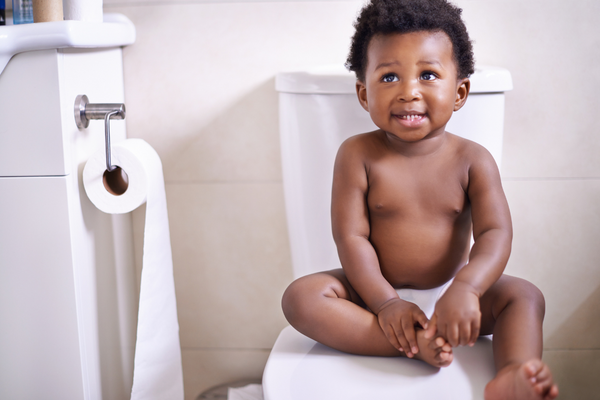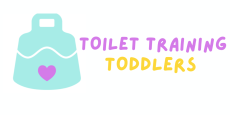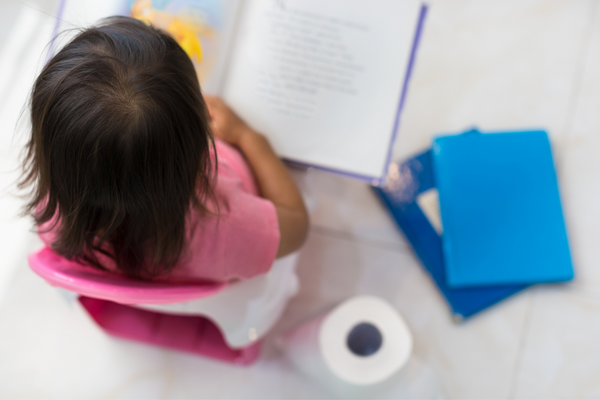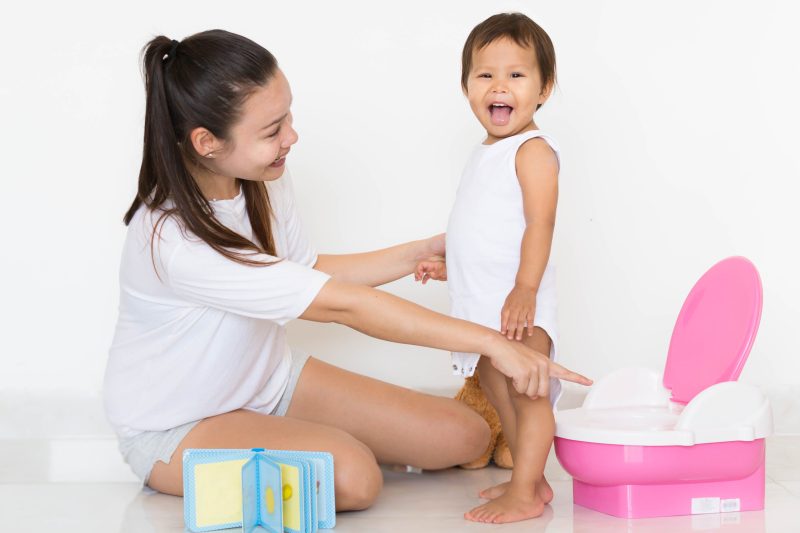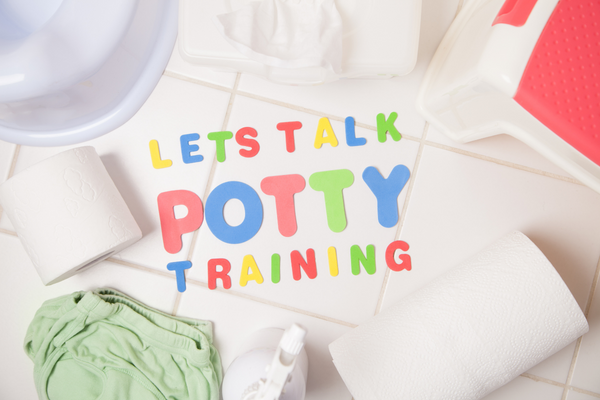When my baby turned 1 year old, I remember thinking to myself, ‘what is the average age for potty training a child?’
According to potty training age statistics, the majority of children are prepared for this process when they’re between 18 months and 3 years. However, each child is different and some may not be ready until they are a bit older.
I wish someone had told me this!
Sadly, I didn’t get an accurate answer from my fellow mom friends and older relatives.
Everyone gave me some vague responses like, ‘you’ll just know,’ or ‘your baby is too young for you to think of potty training’, and so on.
So I relaxed and one day, I woke up and my child was 3 years old – still using diapers. I panicked, went into full research mode, and tried a couple of things to help him start using the potty. Luckily for me, it worked.
I don’t want you to wait too long like I did to get started, so I’m going to guide you on when to start potty training.
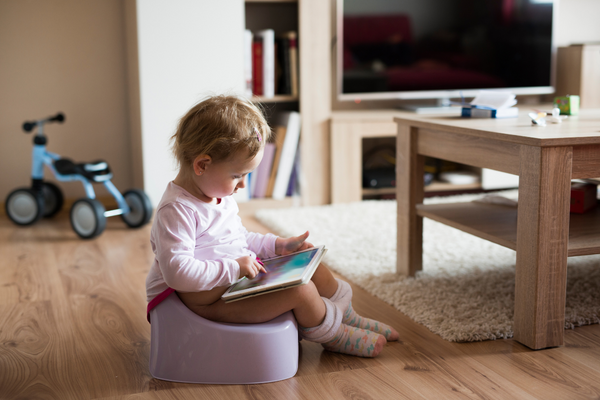
What Age Should A Baby Start Potty Training?
The short answer is that the typical age for potty training is between 18 months to 3 years. The long answer is that there isn’t a one-size-fits-all when it comes to potty training children.
As much as your baby’s age can guide you on when to start potty training, their developmental milestones are an accurate indication of whether or not they are ready for this step.
For example, some children start crawling, walking, eating, or talking earlier than others.
When you monitor your baby’s milestones, you’ll have an understanding of whether it’s too early to start or not. For example, if your baby is still learning how to walk then it may be difficult for them to even get to the potty when they need to, meaning you could hold off for sometime (unless you want to try the Elimination Communication method, also known as Infant Potty Training).
Some of the questions you should ask yourself are:
- Can my child follow instructions?
- Do they know how to pull down their pants?
- Can they walk to the toilet or where the potty is?
How Do I Know My Child Is Ready For Potty Training?
As we’ve discussed, it’s important to know when your child is ready for the potty training process. Here are some signs you should look out for:
- They get excited when they see others using the potty and want to copy them
- They tell you when they’ve peed or pooped in their diaper or when it’s about to happen
- They can follow simple instructions like sit, play with your toy, hand me that remote, and so on
- They start pulling at their diaper when it’s wet or full or even tell you to change them
- Their diaper stays dry for 2 hours or more
- They can understand terms related to potties such as ‘pee’ or ‘poop’
- They hide when they want to relieve themselves
When Is The Average Age For Potty Training For Boys?
The average age for potty training boys is the same as for girls.
Even though some studies suggest that boys start potty training later than girls, according to the American Academy of Pediatrics (AAP), these studies do not represent individual children.
AAP also added that the most important factor in determining the right time for potty training boys is an individual child’s readiness – which is the same for girls.
So this goes back to our previous section of looking at the signs your child is ready to learn how to use the potty.
The difference is usually the time it takes for boys and girls to complete the potty training process. Studies show that on average, it takes children about 6 months to be fully potty trained. However, girls complete this process 2 to 3 months before boys.
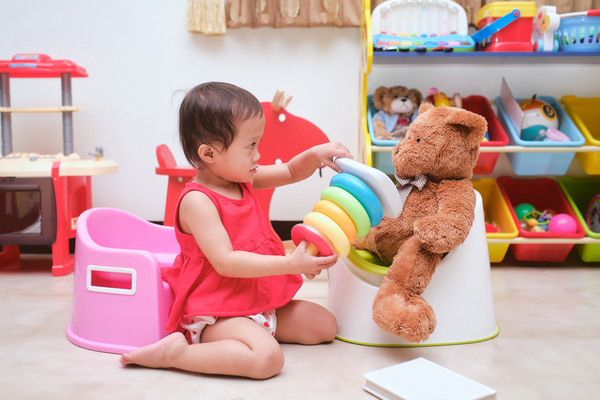
What About Potty Training For Children With Special Needs?
It often takes children with special needs longer to be ready for potty training.
As we’ve discussed, a child’s developmental milestones greatly contribute to when they’re prepared to start using the potty. And children with special needs may delay in achieving some of these milestones like walking and so on. Thus, it takes them longer to be able to ready to use the potty.
Most children with special needs know how to use the potty when they are about 5 years old.
At What Age Should A Toddler Be Completely Potty Trained?
First of all, what do we mean by fully potty trained?
This refers to a child that can identify when they need to use the bathroom and can access it, pull down their pants, pee or poop, wipe themselves and pull up their pants with little to no help.
There are times you will still help your child with wiping them after bowel movements. This usually goes on until the ages of 5 and 6. So this is the age you can expect your child to be fully potty trained.
Choose A Potty Training Method
When you’re sure your child is ready for potty training, it’s time to decide how you’ll go about it.
There are different types of potty training methods and you are free to choose which one is more suited for you and your toddler.
I started with the day training because I was working from the home at the time and had time to focus on this.
Daytime potty training involves guiding your child on how to use the potty during the day. At night, they can continue to use diapers.
Then there’s nighttime potty training which is all about getting them to use the potty at night insead of sleeping in diapers.
We also have elimination communication potty training, which is a different approach involving learning your child’s cues from as early as 6 months old.
No method is superior to the rest so you can pick which one you’re most comfortable with.
So, When Should You Start Potty Training Your Child?
We’ve established that the typical age for potty training is from 18 months to 3 years, but you can start as early as 6 months old (or from the age when they can sit unassisted).
However, we’ve also seen that there are many factors that determine the right time to start this journey. Some of these factors include their developmental milestones, whether or not they have special needs, and/or most importantly if they are ready for potty training.
If your baby is 18 months and above, you can observe them to see if they are ready to be potty trained based on the signs shared in this article.
The most important thing is to be patient, be there for them, be consistent with the training and celebrate every effort they make toward learning how to use the potty. To help, here’s a guide on how to start potty training.
